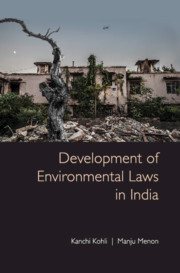Book contents
- Frontmatter
- Contents
- List of Tables
- Preface
- Acknowledgements
- Introduction: Environmental Laws and Development in India
- 1 Fundamentals of Environmental Law
- 2 Institutions Regulating India’s Environment
- 3 Forest Reservation and Conservation
- 4 Pollution Control and Prevention
- 5 Environmental Protection
- 6 Wildlife and Biodiversity Conservation
- 7 Ground and Surface Water Extraction
- 8 Land Acquisition
- 9 Climate Litigation and Policy Frameworks
- 10 Contemporary Environmental Law Reforms
- Index of Laws, Legal Cases and Government and Parliamentary Committee Reports
- General Index
7 - Ground and Surface Water Extraction
Published online by Cambridge University Press: 31 July 2021
- Frontmatter
- Contents
- List of Tables
- Preface
- Acknowledgements
- Introduction: Environmental Laws and Development in India
- 1 Fundamentals of Environmental Law
- 2 Institutions Regulating India’s Environment
- 3 Forest Reservation and Conservation
- 4 Pollution Control and Prevention
- 5 Environmental Protection
- 6 Wildlife and Biodiversity Conservation
- 7 Ground and Surface Water Extraction
- 8 Land Acquisition
- 9 Climate Litigation and Policy Frameworks
- 10 Contemporary Environmental Law Reforms
- Index of Laws, Legal Cases and Government and Parliamentary Committee Reports
- General Index
Summary
INTRODUCTION
According to the Indian Constitution, state governments have exclusive powers to legislate on ‘water supplies, irrigation and canals, drainage and embankments, water storage and water power’. Fisheries regulation is also the responsibility of the state. However, these powers interface with the central government's rights to enact and implement laws on the following aspects related to water. These are regulating and development of interstate rivers and river valleys in public interest, declaring rivers as national waterways for the purpose of shipping and navigation, using tidal waters for shipping, and fishing beyond territorial waters.
Individuals have the right to collect and use water on their property. This includes ‘all water under the land within his own limits, and all water on its surface that does not pass in a defined channel’. These rights are defined under the Indian Easements Act, 1882. Such easement rights are exercised when an individual seeks to draw groundwater or water from a stream on his or her own property for any purpose, including drinking and irrigation. This right is not absolute, but one regulated by the state or central government. Legal and regulatory frameworks on water need to take into account individual easement rights over water resources.
This complicated distribution of rights and powers to govern water resources have led to a web of institutions that cut across the central and state jurisdictions. While the Ministry of Water Resources and Ganga Rejuvenation (water resources ministry) is the central ministry for water governance, state governments have their own departments and authorities that govern the supply, storage and use of surface water. For the regulation of groundwater, 13 state governments and union territories (UTs) have adopted the central government's model groundwater bill. This allows them to set up their own groundwater authorities, while a central authority regulates the groundwater resources in the remaining states.State governments also have their own irrigation laws that regulate, use and supply water available in rivers, dam reservoirs and underground sources. These irrigation laws were not designed to address environmental aspects of water extraction.
Water experts have declared that the institutional frameworks for the management of water in India are outdated. The report of the Mihir Shah Committee of 2016 states that these frameworks were made at a time when the objective of governments was to provide irrigation in the interest of food security.
- Type
- Chapter
- Information
- Development of Environmental Laws in India , pp. 235 - 265Publisher: Cambridge University PressPrint publication year: 2021



